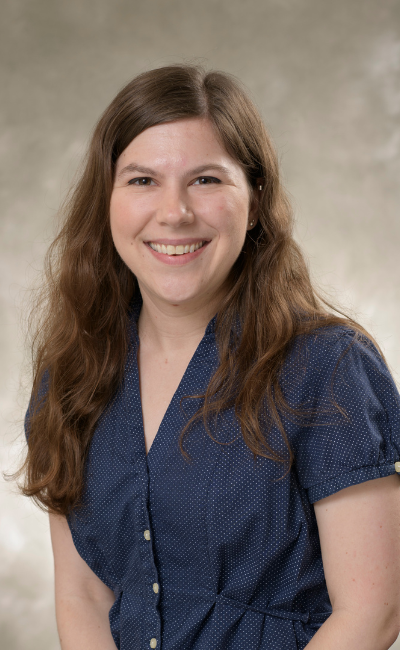Article
 Jenna CarioJenna Cario is a fourth-year Ph.D. student in electrical and computer engineering at the University of Illinois Urbana-Champaign.
Jenna CarioJenna Cario is a fourth-year Ph.D. student in electrical and computer engineering at the University of Illinois Urbana-Champaign.
At the Beckman Institute, Cario collaborates with ECE professor Michael Oelze in the Ultrasound Research Laboratory. Her research focuses on designing a small electronic implant that can communicate with an ultrasound imaging system, aiming to improve tracking of breast cancer being treated by chemotherapy.
What is the most important question you want to answer through your research?
The most important question I would like to answer through my research is if we can address difficulties that clinicians encounter in trying to visualize, with ultrasound, breast lesions being treated by chemotherapy.
What made you first take an interest in your field? Do you have a personal connection to your work?
My interest in biomedical ultrasound stems from an array of interests, including signal processing, electronic design, biology, and, most importantly, my desire to use my skillset to make people’s lives a little bit easier. Like many people, I have had loved ones diagnosed with cancer and breast cancer in particular; understanding the stress that the process that cancer diagnosis and treatment brings helps to motivate me and reminds me that the work that I am doing could have a very direct and tangible impact on people’s lives.
Beckman’s mission is to build a better world. How does your research make the world better?
My research stands to make the lives of clinicians and breast cancer patients a little bit easier. Currently, when the implanted metal clips used to track breast cancer through chemotherapy can’t be seen with ultrasound, patients have to undergo more uncomfortable imaging procedures, and clinicians have to take more time than would otherwise be necessary to complete what they need for the patient. Even small setbacks like these could be an unhappy tipping point in an already stressful process for patients or a constant source of annoyance for clinicians, and I think eliminating or even reducing even a small stressor like this could have a resonating impact that ultimately makes the world a better place.
Describe a transformative moment or experience you have had at Beckman.
One of my more transformative experiences was the first time I got a part of my research to work — really work, like I needed it to — after months of limited success. I remember sitting in the lab, looking incredulously at the oscilloscope showing the signal I was trying to get. I think I may have cheered!
Being a student is hard. What advice do you have for the next generation?
My best advice is that who you work with is just as important as the work you are doing, if not more. Find people who support you, support your progress, and who make you feel like you are becoming a better person. Have a network of people outside of your education that support you. And if you still feel overwhelmed, don’t wait to seek additional help. You know best what you need.
Who or what has influenced you the most?
One of my greatest influences, at least in pursuing a Ph.D., has been my oldest brother. He and I think a lot alike, and he decided to pursue a Ph.D. of his own. Having his advice and insider knowledge, so to speak, has been a constant source of support.
What are you passionate about?
I really enjoy creating art, which has been a hobby of mine since I was first able to pick up a drawing implement. I like the process of creating something from nothing, and I like trying out different color schemes in order to evoke different feelings, memories, and emotions. It’s also really fun to look back at my old work sometimes and be able to see my interests and technical prowess evolve with the passing of time!
Imagine that you’re the host of a new podcast. What is it about?
It’s possible to get me rambling about Pokémon games for a fairly long period of time, so I feel like that would be the go-to.
What is your favorite book and what life lesson has it taught you?
Admittedly, it’s been a while since I got to read for leisure or think about if I have a favorite book, even, but the first book that comes to mind is "The Art of Racing in the Rain." A central theme in the book is “La macchina va dove vanno gli occhi," or "the car goes where the eyes go." You are going to unconsciously steer in the direction you are looking, so don’t lose sight of where you are trying to go.
Tell us about your post-university plans!
I’m still figuring my post-university plans out! I would like to work in industry related to ultrasound or electronic design and hopefully earn enough to buy a house and do some traveling. I don’t know about the what or where just yet, but I trust myself to figure those details out as they come.
Speed Round:
Favorite song at the moment: Hoppípolla by Sigur Rós
Something you’re looking forward to in the next month: Some circuit boards I had manufactured arrived just after I left for break, so I’m excited to solder the components on them and finally be able to test them!
What do you like to do in your free time outside of the lab? I like to draw, especially digital art, and hang out with my two cats, Theta and Pascal.
Beckman Institute for Advanced Science and Technology